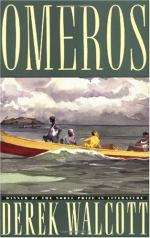In the following essay, "The Aleatory Muse of Omeros," Hamner surveys ways that Walcott's work both adheres to and diverges from classic epic traditions.
Omeros and wisely proceed to Walcott's deviations from the traditional formula. At this point some conventional approaches begin to note perceived weaknesses. One common objection, voiced by David Mason in
The Hudson Review and Sean O'Brien in
The Times Literary Supplement, is that Walcott errs in attempting to include Euro-American material in what is ostensibly a West Indian epic. Another complaint, offered by Christopher Bakken in
The Georgia Review, is that rhetoric occasionally threatens to overwhelm the narrative impetus. One answer to both these concerns is that
Omeros is to a significant extent the offspring of chance, fortune, the coincidental roll of dice, Walcott's aleatory muse. At least this is a stratagem, an authorial ploy that allows Walcott to exploit the ambient space...






